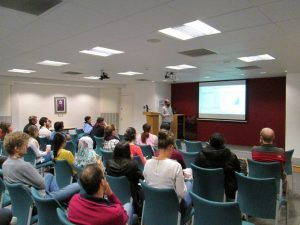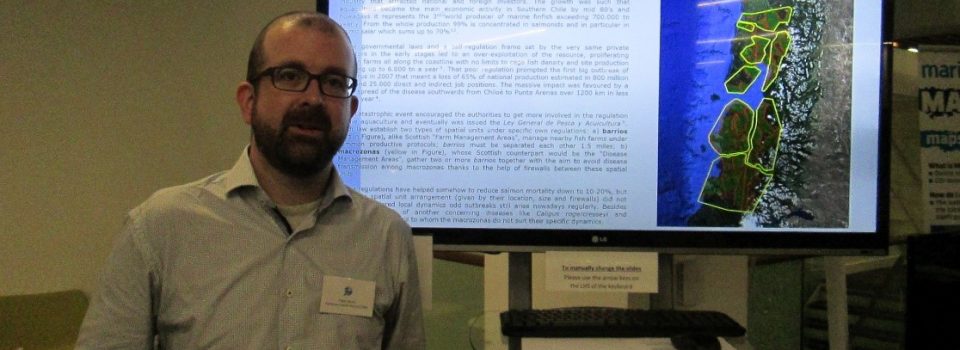Pablo Reche from IFOP presents work on salmon sanitary connectivity in SAMS, Scotland
October 25th, 2017
As part of health connectivity line development research in which Instituto de Fomento Pesquero(Fishing Promotion Institute) has been implementing projects since 2014, between September 25 and October 6, Pablo Reche IFOP’s researcher (https://www.ifop.cl/pablo-reche-garcia) has an internship in Scotland where he was able to meet with specialists in the field in order to expand the future prospects of this research line.
Health connectivity is the term that describes transports and exchanges of water bodies determination and estimation, and in turn of the possible pathogens that such bodies of water may contain, between plots of water from the marine environment. The interest of the Fisheries Promotion Institute is centered on salmon farming, since it is a strategic national resource of great importance in regions X, XI and XII, and because of the great impact that this industry historically has suffered because of spread of diseases among production units. Pablo Reche explained that “The first objective (currently under development) of the Institute of Fisheries is to identify and quantify by means of numerical simulation with 3D models, transport by the currents of each of the main types of pathogens of influence in evaluating current state of spatial planning of production and management units (cultivation center – grouping of concessions – macrozones) and finally to formulate a new proposal of territorial organization that eliminates, or reduces to the extent of possible, disease transmission between production units and management of aquaculture activity “.
The Scottish Association for Marine Science (SAMS) is a leading institution in Scotland researching a wide range of issues related to the marine environment and interactions with human activities. These topics include health connectivity, led by Dr. Thomas Adams (https://www.sams.ac.uk/people/researchers/adams-dr-thomas/) with whom Pablo Reche held a series of meetings among September 25 and October 2 at SAMS headquarters in Oban to first present the Chilean case, and then look for common points with the Scottish case, discussing methodologies that satisfy the questions that arise in solving this problem.
According to Pablo “Scotland is one of the pioneer countries in salmon cultivation, and for many years before Chile they have suffered production losses due to salmon diseases (ISA virus and sea lice mainly) that their experience in mitigating infectious outbreaks from connectivity studies is even greater. SAMS has the human resource that positions it as a leading research center in this and other areas and for this reason it was considered as the first option when it comes to expanding IFOP’s horizon in this research line “.
Parallel to and within SAMS summer seminar program, an exposition of IFOP’s research connectivity line was carried out, along with IFOP’s(Institute of Fisheries Promotion) diffusion role as consultant of the state of Chile and of other research lines that the group of physical oceanography (dependent of the Department of the Environment, and in turn of the Division of investigation in Aquaculture) carries out in Putemun base as they are the development of an operational model of meteorological-oceanographic forecast, program of red tides and models of load capacity.
The internship in Scotland concluded with the Annual Science Meeting held every year (MASTS 2017 – http://www.masts.ac.uk/annual-science-meeting/) which took place between on 4 and 6 October at the Center for Technology and Innovation at the University of Strathclyde in Glasgow. The Annual Science Meeting organized by MASTS is a unique event bringing together institutions and researchers from the Scottish scientific community to showcase their own developments and developments in a wide range of marine science related subjects such as biology, ecology, physical oceanography and environmental regulation, among others. Pablo Reche presented an interactive poster within the session of “Circulation, dispersion and connectivity in Scottish Waters” (available at http://www.masts.ac.uk/annual-science-meeting/2017-programme-and-abstracts/wed-4th-oct/), which introduced the Chilean public health problem in the transmission of diseases among salmonid farming centers and theIFOP’s role in order to solve this problem which affects so much one of the main national industries.
Finally, Pablo evaluated his experience as “enriching thanks to the exchange of knowledge with professionals of high recognition in connectivity matters, as well as gratifying by the good reception and interest of the scientific community specialized in Scotland for the situation of salmoniculture in Chile and the challenge of its solution. “
